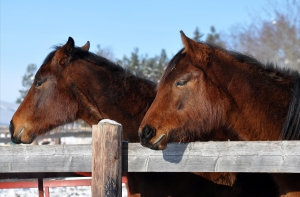Equine Therapy for Post-Traumatic Stress Disorder
Are you in search of a creative, interactive approach to treating post-traumatic stress disorder?
Several years ago, when horseback riding, I reached behind me for my raincoat that was strapped to the back of the horse. As I swung the coat toward me to put on, the horse bucked and started running. I panicked and forgot what I had learned a few moments earlier – not to hold the reins too tightly, which will only make the horse pull harder, or lean forward, which signals the horse to run faster. The guide, who was not far behind me on his own horse, yelled for me to let up on the reins and sit back. I took a few deep breaths and and did as he said. The horse soon slowed, then finally came to a gentle stop. After my heart slowed from a gallop to a trot, the guide explained to me that I had startled the horse with my yellow coat.
Soon after that incident, I went horseback riding again, and had a positive experience. Since then, I have not been on a horse; I’m not sure why? As I age, am I more fearful that I will get hurt? Yes. And living with PTSD has made me more fearful of taking unnecessary risks. So why would I even think about getting on a horse to trot through wild territory? But horses are extremely affectionate and accepting animals, and have a lot to offer human beings.
For more than fifty million years, horses have played a role in transportation, entertainment, farming, and more. By nature, horses are instinctive and highly alert and, therefore, equine therapy can help those suffering from PTSD symptoms like hyper-vigilance. Horses may not speak, but they do communicate by mimicking human emotions. For instance, if you are feeling anxious, horses will react by, say, widening their eye or flicking their ears. In other words, horses are our mirrors. Their non-verbal feedback is a prompt for us to better understand our internal processes. We can then modify our behaviors. The key is to be in-tune with how horses react when you are with them. Equine therapy has been noted to help with emotional healing: among a long list of benefits, it decreases anxiety, improves social skills, assists in better communication; and increases confidence, self-awareness, and trust.
I recently decided that, in order to confront my fear of horses, I need to get back on a horse soon. So that’s what I intend to do this summer.
If you’re interested in equine assisted psychotherapy program, check it out!


Recent Comments